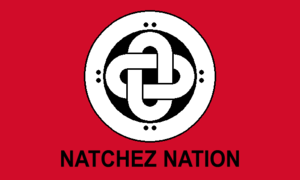
Back شعب ناتشيز Arabic Натчэз Byelorussian Натчези Bulgarian Natchezeg Breton Natchez (grup humà) Catalan Načezové Czech Natchez-stammen Danish Natchez (Volk) German Natchez (pueblo) Spanish Natchezit Finnish
This article includes a list of general references, but it lacks sufficient corresponding inline citations. (February 2023) |
 | |
| Total population | |
|---|---|
| est. 6,000[citation needed] | |
| Regions with significant populations | |
| Mississippi – Natchez Bluffs, (historical), | |
| Languages | |
| English, French, Natchez | |
| Religion | |
| Christianity, Native | |
| Related ethnic groups | |
| Muscogee, Cherokee |

The Natchez (/ˈnætʃɪz/ NATCH-iz,[1][2] Natchez: [naːʃt͡seh][3]) are a Native American people who originally lived in the Natchez Bluffs area in the Lower Mississippi Valley, near the present-day city of Natchez, Mississippi, in the United States. They spoke a language with no known close relatives, although it may be very distantly related to the Muskogean languages of the Creek Confederacy.[4] An early American geographer noted in his 1797 gazetteer that they were also known as the "Sun Set Indians".[5]
The Natchez are noted for being the only Mississippian culture with complex chiefdom characteristics to have survived long into the period of European colonization. Other Mississippian societies in the southeast had generally experienced important transformations shortly after contact with the Spanish Empire or other newcomers from across the ocean. The Natchez are also noted for having had an unusual social system of nobility classes and exogamous marriage practices. It was a strongly matrilineal kinship society, with descent reckoned along female lines. The paramount chief named the Great Sun was always the son of the Female Sun, whose daughter would be the mother of the next Great Sun. This ensured that the chiefdom stayed under the control of the single Sun lineage. Ethnologists have not reached consensus on how the Natchez social system originally functioned, and the topic is somewhat controversial[vague].
In 1731, after several wars with the French, the Natchez were defeated. Most of the captured survivors were shipped to Saint-Domingue and sold by into slavery; others took refuge with other tribes, such as the Muskogean Chickasaw and Creek, and the Iroquoian-speaking Cherokee. Today, most Natchez families and communities are found in Oklahoma, where Natchez members are enrolled in the federally recognized Cherokee and Muscogee (Creek) nations in Oklahoma. Two Natchez communities are recognized by the state of South Carolina.
- ^ Merriam-Webster's Collegiate Dictionary (11th ed.). 2004. p. 825.
- ^ American Heritage Dictionary of the English Language (5th ed.). 2011. p. 1173.
- ^ Kimball 2005, p. 426.
- ^ Geoffrey Kimball, "Natchez", in Native Languages of the Southeastern United States, ed. Janine Scancarelli and Heather Kay Hardy, University of Nebraska Press, 2005, pp. 385–453, accessed 9 Dec 2010
- ^ Morse, Jedidiah. (1804). The American gazetteer : exhibiting a full account of the civil divisions, rivers, harbours, Indian tribes, &c. of the American continent, also of the West India and other appendant islands : with a particular description of Louisiana. 2nd edition. Charlestown, Massachusetts: Printed by and for Samuel Etheridge, and for Thomas and Andrews. p. 358. The Internet Archive website
© MMXXIII Rich X Search. We shall prevail. All rights reserved. Rich X Search